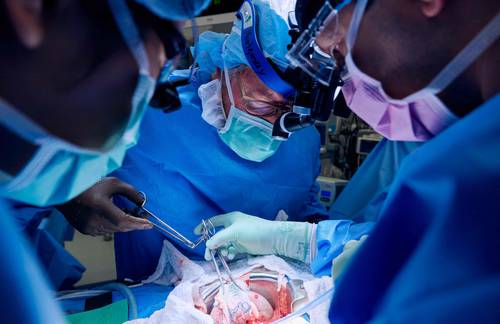NY. Doctors transplanted a pig kidney into a New Jersey woman on the brink of death in a pair of dramatic operations that also stabilized her failing heart.
The combination of heart and kidney failure meant Lisa Pisano was too sick to tolerate a traditional transplant and had no options left. Doctors at NYU Langone Health at New York University came up with a novel one-two punch: implant a mechanical pump to keep the heart beating and then transplant a kidney from a genetically modified pig.
Pisano is recovering, the NYU team announced yesterday. It is only the second case of a patient receiving a pig kidney – the first was last month at Massachusetts General Hospital – and the most recent in a series of attempts to make animal-to-human transplantation a reality.
This week, the 54-year-old took a walker and took her first steps.
I was at the end of the road
dijo Pisano a The Associated Press. I took advantage of an opportunity. Worst case scenario, if it didn’t work for me, maybe it will for someone else and help the next person.
.
Robert Montgomery, director of the NYU Langone Transplant Institute, recounted the cheers in the operating room when the organ immediately began making urine.
It has been transformative.
commented on the initial results of the transplant.
However, we are not safe yet
said Nader Moazami, an NYU heart surgeon who implanted the heart pump.
With this operation, I can see my wife’s smile again
said Todd, Pisano’s husband.
Other transplant specialists carefully observe the patient’s evolution.
I must congratulate you
said Tatsuo Kawai of Massachusetts General Hospital, noting that his patient receiving a pig kidney was in better overall health than NYU’s before the operation. When the heart functions poorly, it is really difficult to make an implant of that organ
.
In the United States, the list of people waiting for an organ reaches 100,000. Most need a kidney and thousands die waiting. Given the shortage of donors, several biotechnology companies are genetically modifying pigs to make their organs more similar to humans and less likely to be destroyed by the immune system.
NYU and other research teams have performed pig kidney and heart transplants into brain-dead bodies, and the results have been promising. The University of Maryland transplanted pig hearts into two men who had no other option and both died within months.
New hopes
A kidney transplant last month at Massachusetts General Hospital raised new hope. Kawai noted that Richard Slayman suffered initial rejection, but recovered, was able to return home weeks ago and is doing well five weeks after the transplant. A recent biopsy showed there were no new problems.
Pisano is the first woman to receive a porcine organ, and unlike previous experiments with xenotransplantations, she suffered from kidney and heart failure. She suffered cardiac arrest and had to be resuscitated before experimental operations. She was so weak that she couldn’t play with her grandchildren. I was miserable
said the Cookstown, New Jersey, resident.
Heart failure prevented him from receiving a traditional kidney transplant. But since he was on dialysis, he could not be given a heart pump, called a ventricular assist device or VAD.
It’s like being in a maze and you can’t find a way out.
Montgomery said. Until surgeons decided to pair a heart pump with a pig kidney.
With emergency permission from the United States Food and Drug Administration (FDA), Montgomery chose an organ from a pig genetically modified by United Therapeutics Corp so that its cells do not produce a sugar foreign to the human body and which causes immediate rejection.
And an additional modification: The donor pig’s thymus, a gland that governs the immune system, was attached to the kidney in the hope that it would help Pisano’s body tolerate the new organ.
Surgeons implanted the VAD on April 4 to power Pisano’s heart and transplanted the kidney on the 12th. While the long-term outcome cannot be predicted, so far he has shown no signs of rejection, Montgomery explained. And by adjusting the device to work with her new organ, Moazami explained that doctors have learned lessons that could be useful for patients with heart and kidney failure.
He Compassionate use
The experiments hold many lessons for doctors, but rigorous studies will be needed to show whether xenotransplants work. What happens with Pisano and the organ recipient at Mass General will affect the FDA’s decision to allow such experiments. United Therapeutics announced it hopes to start one next year.
